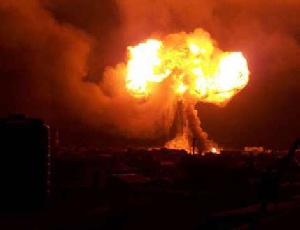 File photo: Sometimes LPG fires occur in circumstances that are unexpected or unpredictable
File photo: Sometimes LPG fires occur in circumstances that are unexpected or unpredictable
For longer than recorded history, fire has been a source of comfort and catastrophe for the human race. Early humans used fire to keep warm, cook food, and frighten predators. Sitting around the fire also helped them to unite and strengthened family groups and consequently speeded up evolution.
However, fire also posed great risks and challenges to early people, including the challenge of starting and controlling fires, and grappling with the threat of burns and wildfires. Fire continues to be a basic everyday element of most people's lives. This tendency of one of man's best friends to turn into his worst enemy cannot be underplayed, as improper handling and use of LPG has led to several accidents in homes, offices, schools, and other public places with very serious repercussions.
Fire is believed to be basically based on three elements: fuel, ignition source, and oxidizing agent (usually atmospheric oxygen). Fuel can be classified into three; flammable solids, flammable liquids and flammable gasses. Common flammable solid fuels include; wood, paper, plastics clothes, leather etc. examples of flammable liquid fuels include; kerosene, diesel, petrol, alcohol, solvents (eg. Turpentine), oil paints, aerosols etc. examples of common flammable gasses include; LPG, acetylene, ammonia, arsine, butane, carbon-monoxide, propane, isobutane etc.
The most common ignition sources in domestic places include; cooking or heating equipment, electrical sparks, naked flames like matches sparks, lighted candle etc. Sometimes LPG fires occur in circumstances that are unexpected or unpredictable. The occurrence of fire disasters is not a new phenomenon in the history of the country. There is no doubt therefore, that these recent LPG fire outbreaks have not generated enough discussions on causes and prevention. However, the question that needs to be addressed is: What is the real cause of these recent domestic LPG fire outbreaks in the country?
In Ghana, fire incidents have become a regular occurrence, with hundreds of lives and millions of Ghana cedis lost every year. Hardly a day passes without news of a fire outbreak in some parts of Ghana, causing fear and panic among the people. This article seeks to discuss the rising spate of Domestic Gas Incidents in Ghana and ways to prevent these incidents.
WHAT IS LPG AND WHERE DOES IT COME FROM?
Liquefied Petroleum Gas (LPG) is a by-product of natural gas production and crude oil refining and so technically it is a fossil fuel. This puts LPG into the same category as other traditional fossil fuels such as diesel, kerosene and fuel oil. Liquefied Petroleum Gas is a clean burning fuel associated with low carbon emission, together with clean handling properties (LPG will never create the same pollution hazards that other fossil fuels produce). In other word its environmental friendliness makes it a unique fuel for consumption.
PROPERTIES OF LPG
a) It is Colourless, b) It is also odourless, c) It is half as heavy as water when in liquid form, d) It will float on water before vaporising, e) It is as twice heavier- than- air, f) It is easily liquefied by pressure, taking up only around 1/250th of its gaseous volume. This means that a large amount of LPG can be stored in a small place.
DANGERS ASSOCIATED WITH LPG
The primary dangers created by LPG are fire / explosion, carbon monoxide poisoning, asphyxiation, and extreme cold. As the gas is liquefied, the pressure can increase rapidly when the it is heated. If the pressure build-up is very rapid, such as when the cylinder may be directly exposed to fire, a cylinder failure and subsequent explosion may occur. High degree flashback is associated with LPG leakage and proximity to ignition source(s) as the leak gas will travel to the ignition point, pick fire and return it to the leak source.
Possible Explosion: the danger is that, when filled cylinder is on fire, heat built up in the system increases. this weakens the metallic cylinder weak points and cause it to explode. Formation of explosive mixtures: LPG has LEL (Lower explosive limit) of 1.9% and UEL (Upper explosive limit) of 9.5%. This means that, If the liquid leaks and mix with the atmospheric air within the stated range, be aware that ignitable mixture is formed and can ignite or explode at any time.
MAIN CAUSES OF DOMESTIC LPG LEAKAGE
1. Loose Cylinder Head Fittings: When the cylinder head is not properly secured on the cylinder bottle, it gives way for the gas to come out through the openings around the head.
2. Loose Hose Clips: The hose clip is supposed to secure the ends of the hose, that is at the regulator end and at the stove or burner end. When any of these two sides is not properly tightened, the gas will flow out when the regulator is turned on.
3. Overage / Burst Hose: When hoses are overage, they become brittle which makes it easy to develop cracks/punches. Likewise, if a sharp or pointed edge tool strike or hit it, holes or punches are easily created. When holes are created on the hoses by any of these means or any other means, it creates an avenue for leakage when the hose is under tension (when regulator is turned
on).
4. Worn Out Rubber: These seals are mostly located inside the cylinder heads and regulator openings. The seals are meant to create airtight at the coupling ends when the joints are under tension. When they get worn out, they reduce in size and therefore fail to create airtight situation. This situation when happens allows gas to flow out when activated.
5. Faulty Regulators:
6. Improper Assembling Of Peripherals such as
7. Lack of general maintenance culture.
SAFETY TIPS
* Make sure your cylinder head is firmly secured on the cylinder
*To be on the safer side, change seals on every refill.
*Regularly check your hose for signs of damage or cracking.
*Change hose after every two years of continues use or when damage is detected.
*When not in use, turn off the regulator tap.
*Do not let children handle the cylinders or peripherals.
*Make sure the cylinder is upright.
*Cylinders need to be re-approved every 10 years from the date of manufacture or date of re-testing.
*Open all doors and windows to ventilate the building.












